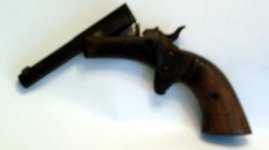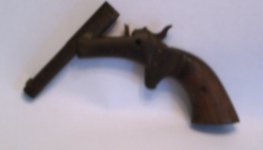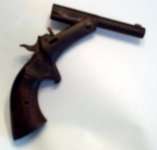561packrat
Inactive
I have a .22 cal. Stevens top- break, single shot pistol. It's been in the family so long, no one remembers where it came from. Finish is worn-rough, missing action latch ? or safety? on frame . Firing pin (nail?) is really peened from years of dry firing. Top of barrel marked, I Stevens A & T Co, Chicopee Falls (?), serial # 32946 on side of barrel below chamber. Some kind of hinged extractor/barrel catch in frame below chamber. Approx. 3.25" barrel w/blade front sight.
Looks like something that would fit in your boot, walnut smooth grips. The portion of the rear of the frame and grip curve reminds me of the look of the Smith&Wesson .44 topbreak.
I would like to know a little about it if possible.
Thanks, Packrat
Looks like something that would fit in your boot, walnut smooth grips. The portion of the rear of the frame and grip curve reminds me of the look of the Smith&Wesson .44 topbreak.
I would like to know a little about it if possible.
Thanks, Packrat




